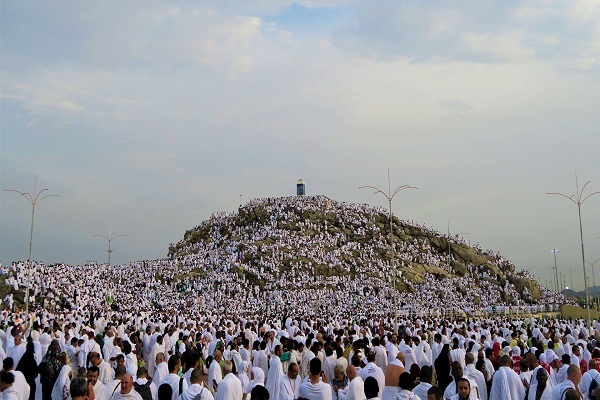Ahlulbayt News Agency: The Day of Arafah is the ninth day in the lunar Hijri month of Dhul Hajjah and the day when the rituals of Hajj begin.
On this day, the Hajj pilgrims all go to the Arafat (Arafah) desert, praying to God, repenting and thanking God for giving them the opportunity to perform Hajj.
After saying the Noon and Asr prayers, and reciting supplications on the hills of Jabal Rahmah, the pilgrims move toward Mashaar Al-Haram so that they can be in Mina on the day of Eid al-Adha.
The Day of Arafah has so much significance in Islam, with some Quran interpreters believing that the word Watr in Verse 3 of Surah Al-Fajr refers to this day.
According to Shia Fiqh, it is Wajib (obligatory) for Hajj pilgrims to have Wuquf (stop) at the plains of Arafat from noon to sunset on this day. That is to say, the pilgrims must not leave Arafat. This Wuquf is one of the Rukns (pillars) of Hajj, meaning that if a Hajj pilgrim deliberately refuses to go to Arafat and stay there for at least some time, his Hajj will not be accepted.
In the Sunni schools of thought, there are differences about the time of Wuquf in Arafah. Some of them say that Wuquf should be from the sunset of the 9th of Dhul Hajjah until the dawn of the day of Eid. Some others say it is from the dawn of the 9th until the dawn of the 10th of Dhul Hajjah, while others believe it is from the noon of the 9th until the dawn of the 10th.
/129
On this day, the Hajj pilgrims all go to the Arafat (Arafah) desert, praying to God, repenting and thanking God for giving them the opportunity to perform Hajj.
After saying the Noon and Asr prayers, and reciting supplications on the hills of Jabal Rahmah, the pilgrims move toward Mashaar Al-Haram so that they can be in Mina on the day of Eid al-Adha.
The Day of Arafah has so much significance in Islam, with some Quran interpreters believing that the word Watr in Verse 3 of Surah Al-Fajr refers to this day.
According to Shia Fiqh, it is Wajib (obligatory) for Hajj pilgrims to have Wuquf (stop) at the plains of Arafat from noon to sunset on this day. That is to say, the pilgrims must not leave Arafat. This Wuquf is one of the Rukns (pillars) of Hajj, meaning that if a Hajj pilgrim deliberately refuses to go to Arafat and stay there for at least some time, his Hajj will not be accepted.
In the Sunni schools of thought, there are differences about the time of Wuquf in Arafah. Some of them say that Wuquf should be from the sunset of the 9th of Dhul Hajjah until the dawn of the day of Eid. Some others say it is from the dawn of the 9th until the dawn of the 10th of Dhul Hajjah, while others believe it is from the noon of the 9th until the dawn of the 10th.
/129

